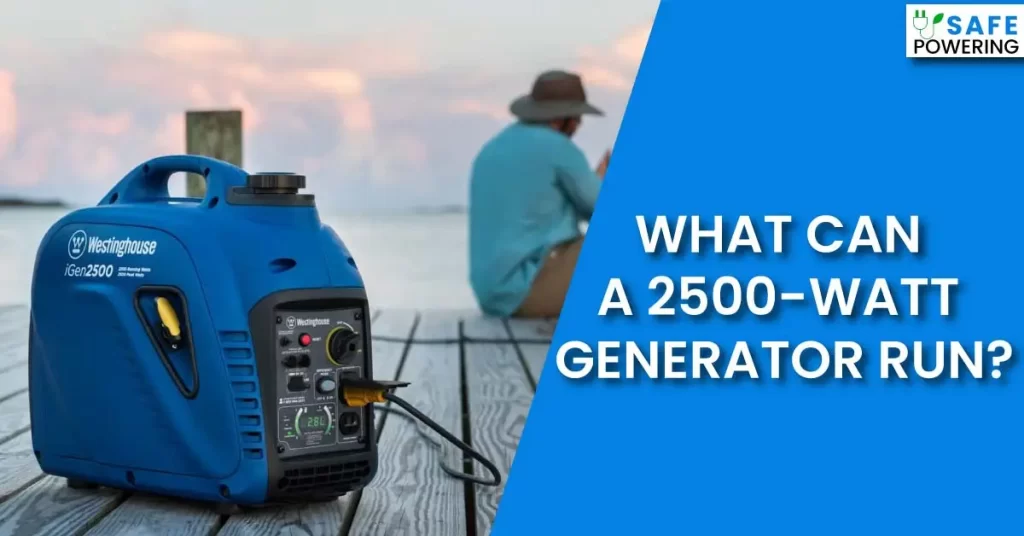What Can a 2500-Watt Generator Run? – Discovering The Limits
This article aims to clear your burring queries about “what can a 2500-watt generator run?”, how many appliances I can run simultaneously, and whether it fits my needs or not.
Read on to get the most out of your 2.5kw machine.
A 2500-watt generator is considered an ideal choice to power up all essentials of camping and tailgating including the small space heater, electric stove, small cooker, chargers, laptop, flashlights, mini fridge, etc.

Starting & Running Wattages of a Generator
Starting/Surge Watts: Maximum wattages a generator could produce for a short time to start power-hungry motorized/compressor-based appliances like air conditioners, sump pumps, heat pumps, etc.
The purpose of starting watts is to provide initial inertia to a heavy-duty appliance, rest of the work will be handled by the rated/running watts once the appliance goes into normal condition.
Note: Starting watts will always be higher compared to the rated watts.
Running/Rated Watts: Maximum wattages a generator can produce for a longer time to run an appliance in a stable condition without voltage or frequency fluctuations. Rated watts will always be lower compared to the starting watts.
What Appliances Can a 2500-Watt Generator Run?
| Appliance | Starting Wattage | Running Wattage |
|---|---|---|
| Heater | 0 | 1800 |
| InstaPot | 0 | 1000 |
| Computer | 0 | 300 |
| Light Bulbs | 0 | 20 |
| Phone Charger | 0 | 10 |
| Refrigerator | 1200 | 200 |
| Dishwasher | 1500 | 1500 |
| Toaster | 0 | 1200 |
| Coffee Maker | 0 | 1200 |
| Sawzall | 960 | 0 |
| Drill | 440 | 600 |
| Television | 0 | 350 |
| Sander | 1200 | 1200 |
| Circular Saw | 1400 | 1950 |
| Angle Grinder | 2000 | 1450 |
| Compressor, 2 gal | 1800 | 1300 |
| Shop Vac | 1800 | 800 |
| Water Pump, ½ hp | 2000 | 900 |
| Hair Dryer | 2000 | 1250 |
| Iron | 0 | 1200 |
| Microwave | 0 | 600-1200 |
| Garage Door Opener (1/2 HP) | 875 | 2350 |
| Space Heater | 0 | 1800 |
| Air Conditioner | 1800 | 650 |
| Blender | 0 | 500 |
| Toaster Oven | 0 | 1200 |
| Camping Refrigerator | 500 | 350 |
| Window Air Conditioner (10,000 BTUs) | 1800 | 1200 |
| Hair Dryer | 0 | 1250 |
| Sump Pump (1/2 HP) | 2150 | 1050 |
| 50 Inch LCD TV | 0 | 150 |
| Cell Phone Charger | 0 | 25 |
| Washing Machine | 1900 | 800 |
Can a 2500-watt Generator Run a House?
It depends on the requirements if you want to operate some of the low power-hungry appliances like Television, lighting, Fans, Microwave, standard-sized Refrigerator, etc. you can go for a 2500-watt machine.
On the other hand, if you have to operate some of the power-hungry appliances like air conditioners, sump pumps, water heaters, heat pumps, dryers, etc., you should have to consider a bigger machine of at least 7,000 – 8,000 watts (what appliances I can run with an 8,000W generator).
The bottom line is, you must have to figure out your actual wattage needs before making any buying decision.
NOTE: 2500 watts of power isn’t enough for even a small household unless you only need to power some of the basic essentials like lights, fans, TVs, refrigerators, microwaves, etc.
Better to consider a bigger machine of at least 5kw so that you will have room to operate most of the essentials you own.
What Can a 2500-Watt Generator Run at the Same Time?
It depends on the power ratings of the appliance you are going to power.
E.g. If you are going to power up 2 appliances of 1220 wattages you don’t have access to plug in another one, however, you have room to plug 8 – 10 appliances of lower wattages like lights, televisions, fans, chargers, etc.
The bottom line is you have to confirm the power ratings of the appliances before plugging them in. Also, we encourage our readers to do the wattage calculation of their household or RV and choose a generator accordingly.
NOTE: Don’t pull 100% of the load from the generator; keep a margin of 10 – 15% so that the generator could run freely. The small margin will not only keep your machine healthy for a longer time but also reduce fuel and maintenance costs down the road.
How to Determine the Power Requirement of Our Household/RV?
- List down the all appliances you are going to run with their starting and running, you can find the running and stating wattages from the energy labeling of a specific appliance.
- If you found the power ratings in amps and you are not comfortable with the calculations, you can use Ohm’s law to do the conversion first.
Ohm’s Law: W (watts or kilowatts) = Amps (Amperes) X Volts (V)
E.g. An appliance is consuming 8 running and 10 starting amps at the voltage of 120V.
W (watts or kilowatts) = Amps (Amperes) X Volts (V)
Running watts: 8 X 120 = 960 watts
Starting watts: 10 X 120 = 1200 watts
- Sum up the starting and running watts and keep them in a separate column.
- Compare the calculated wattages with the machine you are going to choose.
Practical Example:
| Appliances | Running watts | Starting watts |
|---|---|---|
| 50” LED TV | 150 | 0 |
| Camping Refrigerator | 350 | 500 |
| Window Air Conditioner (10,000 BTUs) | 1200 | 1800 |
| Coffee maker | 1200 | 0 |
| Total | 1700 | 2300 |
From the above calculation, we got 1700 running and 2300 starting watts, hence a 2.5kw generator will be more than enough for this quotation.
How Many Amps Will a 2500-Watt Generator Run?
At 120 volts a 2500-watt generator can produce 20.83 Amps; however, at 240 volts you will get 10.41 amps.
NOTE: Most of the 2500-watt inverter generator only provides 120 volts.
Will a 2500 Watt Generator Run an Air Conditioner?
Depending on the size and efficiency of the air conditioner you own, normally a small-sized air conditioner of 5000 – 10000 BTUs will not be a problem for a 2.5kw machine, however, if you own a heavy-duty window/RV/central air conditioner consider a bigger generator.
Can a 2500 Watt Generator Run a Refrigerator?
Yes, a 2.5kw generator will be more than enough to run even a jumbo-sized refrigerator/freezer.
Can a 2500 Watt Generator Run a Washing Machine?
Yes, a normal washing machine needs about 800 – 1500 watts which isn’t a big deal for a 2.5kva unit.
How Long Will a 2500-watt Generator Run?
Depends on the fuel tank size, efficiency, and how much load you are pulling from the generator.
Typically a brandable generator like Champion Power Equipment 200961 inverter-based machine should provide at least 8 – 9 hours of run with a single tank of fuel at 25% load, however, with an increase in the load you will observe a drastic change in fuel consumption.
NOTE: Inverter generators are more efficient, noiseless, and portable compared to open frame (ordinary machines), if you are concerned about efficiency look for a machine with inverter technology.
Verdict
A 2.5kw generator should be your first choice for camping, small outdoor parties, tailgating, etc. However, for a whole house, you should go for a bigger machine that will not only run your lighting, fans, etc. but also the air conditioner, Water heater, sump pump, heat pump, etc.
FAQs – Frequently Asked Questions
Will a 2500 Watt Generator Run a 5000 Btu Air Conditioner?
Yes, a 5000 BTUs air conditioner only needs 400 – 500 watts which isn’t a big deal for a 2.5kw machine.
Will a 2500 Watt Generator Run a 13500 Btu Air Conditioner?
No, a 13500 BTU air conditioner needs about 3000 – 3500 (Read our guide about what appliances a 3500w generator can run) starting watts which isn’t practically possible for a 2.5kw machine.
Will a 2500 Watt Generator Run an RV Air Conditioner?
Depending on the size and efficiency of the RV air conditioner you own, typically a 2.5kw machine can be enough to run 5000 – 12000 BTUs air conditioner.
Will a 2500 Watt Generator Run a Furnace?
Depending on the size of the furnace you own, a normal household or RV furnace will not be a problem for a 2500-watt generator since they only need 1000 – 1500 watts, however, if you own a large furnace of 10000 – 15000 watts, consider a bigger machine of at least 15000 watts (here is the guide about what I can run with a 15kw generator?).
How Much Fuel Does a 2500-watt Generator Use?
Depends on the efficiency of the machine and how much load you are pulling, if you are going to use the generator at 80 – 90% load you will definitely have to compromise on fuel. We have written a detailed guide about how long a generator lasts and what factors affect the runtime.

Kashif has been a valuable asset to the electric generator industry for over 5 years. Now, As a skilled energy engineer, he’s been on the front lines of diagnosing problems, fixing broken parts, and performing routine maintenance tasks to keep generators running smoothly.
